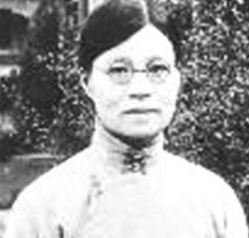In the educational circle of the Republic of China, there is a saying that "the males have Cai Yuanpei, and the females have Wu Yifang." This points out two representative figures in the history of modern Chinese education, one male and the other female. Wu Yifang is as famous as Cai Yuanpei because of her work at Jinling Women's College.
Born in 1893 to a government official's family, Wu Yifang threatened to commit suicide when she was young, to get her parents to agree to her request to attend an all-girls school. While she was studying in Hangzhou, her family encountered many misfortunes. First, her father committed suicide because he was framed. Soon after, his brother, due to his despair for the future, threw himself into a river. When her mother died of grief, her sister could not stand the blow and committed suicide.
The loss of four family members in succession made Wu very sorrowful, to the point of considering suicide. Fortunately, her uncle, Chen Shutong, patiently persuaded her to give up the idea and complete her studies. At that time, the foreign missions in China established Jinling Women's University in Nanjing, intending to promote the development of women's education in China. The College was presided over by a female missionary, Mrs Lawrence Thurston, with "abundant life" as its motto. Its meaning comes from John 10:10: "That they might have life, and have it more abundantly".
Wu was introduced to Jinling Women's University by a female Christian missionary and became the president of the student union, showing her organizational talent. Her classmate, Xu Yiling, a devout Christian, preached the Gospel to her. It was by accepting Jesus Christ as her Savior that she got healed of her grief.
In 1919, five women, including Wu and Xu, graduated from Jinling Women's College, becoming the first batch of female university graduates in China. In 1921, Wu went to the United States to study biology at the University of Michigan and received a doctorate seven years later. At that time, China launched a movement to reclaim the right to education, and many missionary schools appointed the Chinese as chancellors. Therefore, Wu Yifang received an invitation from her Alma mater to become the president of Jinling Women's College. After serving as chancellor, she made an in-depth interpretation of the school motto of "abundant life": "The purpose of life is not only to live for oneself but to help others and the society with one's wisdom and ability, which is not only beneficial to others but also enriches one's life".
During the 23 years in which she presided over the school, the teaching condition at Jinling Women's University steadily improved. The school set up 16 fourth-grade subjects, including Chinese, English, History, Society, Music, Physical Education, Chemistry, Biology, Home Economics, and Medicine. Moreover, she attached great importance to physical exercise. Physical education was a compulsory course for every year. As a result, the students of Jinling Women's University not only succeeded academically but also had healthy bodies.
Although she was a chancellor and a nationally renowned female educator, Wu still maintained her style of hard work and plain living. Mei Ruolan, an alumnus of Jinling Women's College, wrote in her article, "In Memory of Wu Yifang": "Chancellor Wu lived in a room of less than 15 square meters for decades, she usually had simple meals and never paid attention to food and drink. Apart from the need to wear decent clothes out of etiquette, she usually wore plain cotton clothes, stitching-up and mending them as they wore-out, instead of throwing them away. She didn't want a car, but only bought a rickshaw. A huge part of her monthly salary was usually donated to her friends. She also gave the honorarium and gifts she got from her speeches to teachers and students one by one, without letting the recipients know."
During the difficult years of the Anti-Japanese War, Wu Yifang took the majority of teachers and students to the Huaxi Dam in Chengdu and continued to run the school. In this regard, she actively supported the students’ participation in the anti-Japanese national salvation movement, which not only improved their studies but also contributed to the country. During this period, she extensively participated in social activities. In April 1945, she joined the Chinese delegation that went to San Francisco to attend the founding conference of the United Nations. She became the first woman to sign the United Nations Charter.
In the 1950s, due to various reasons, Jinling Women's University ceased running and was merged into Nanjing University. Wu, however, remained active in the field of education, serving as director of the education department in Jiangsu Province. Also, she became the vice president of the Christian Three-self patriotic movement.
Wu Yifang, who rested in the bosom of the Lord in 1985 at the age of 92, had long hoped that Jinling Women's University would be reopened. As a result, with the support and efforts of all parties, the original site of Jinling Women's University (now Nanjing Normal University) was restored in 1987. At present, Jinling Women's University is still training useful talents for society. Chancellor Wu's last wish was finally realized.
(The original article is published by Gospel Times.)
- Translated by Nonye Nancy











